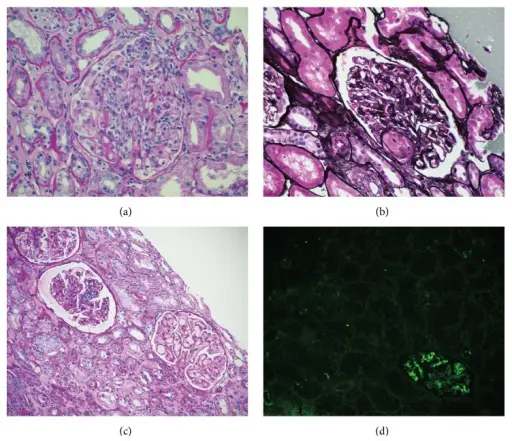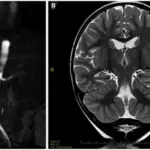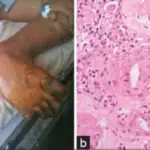Thrombotic microangiopathies involving the kidney is the thrombosis in renal capillaries and arterioles
What is the Pathology of Thrombotic Microangiopathies Involving the Kidney?
The pathology of thrombotic microangiopathies involving the kidney is:
-Etiology: The cause of thrombotic microangiopathies involving the kidney is conditions such as hemolytic uremic syndrome, disseminated intravascular coagulation, and malignant hypertension.
-Genes involved: Unknown.
-Pathogenesis: The sequence of events that lead to thrombotic microangiopathies involving the kidney follows endothelial injury and activation and platelet aggregation causing vascular obstruction and vasoconstriction leading to ischemia.
-Morphology: The morphology associated with thrombotic microangiopathies involving the kidney shows patchy or diffuse renal cortical necrosis.
-Histology: The histology associated with thrombotic microangiopathies involving the kidney shows glomeruli thickening and splitting of capillary walls.
How do Thrombotic Microangiopathies Involve the Kidney Present?
Patients with thrombotic microangiopathies involving the kidney typically have no gender preference reported present at the age range of old age. The symptoms, features, and clinical findings associated with thrombotic microangiopathies involving the kidney include blood stain urine, UTI, high blood pressure, decreased urine, and fever.
How are Thrombotic Microangiopathies Involving the Kidney Diagnosed?
Thrombotic microangiopathies involving the kidney are diagnosed through laboratory studies such as kidney function test, urinalysis. Imaging studies such as ultrasonography, radionuclide scanning, spiral CT angiography.
How are Thrombotic Microangiopathies Involving the Kidney Treated?
Thrombotic microangiopathies involving the kidney are treated by symptomatic management, and managing the underlying cause.
What is the Prognosis of Thrombotic Microangiopathies Involving the Kidney?
The prognosis of thrombotic microangiopathies involving the kidney is good. With proper management, the patient recovers in weeks.



